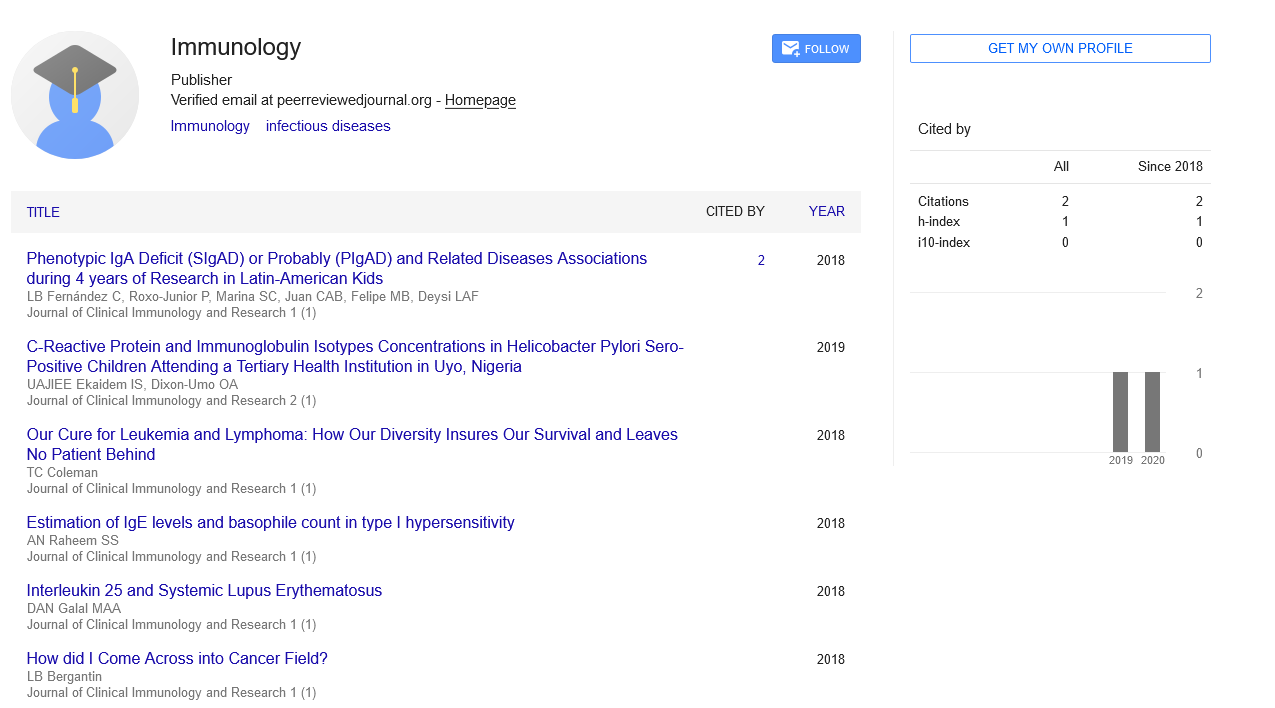Commentary, J Clin Immunol Res Vol: 6 Issue: 2
B Cells Activity : Understanding their Mechanisms Against Pathogens
Eva Brek*
1Department of Immunobiology, Yale University, New Haven, USA
*Corresponding Author: Eva Brek,
Department of Immunobiology, Yale
University, New Haven, USA
E-mail: brekeva@gmail.com
Received date: 15 May, 2023, Manuscript No. JCIR-23-104711;
Editor assigned date: 17 May, 2023, PreQC No. JCIR-23-104711 (PQ);
Reviewed date: 01 June, 2023, QC No. JCIR-23-104711;
Revised date: 08 June, 2023, Manuscript No. JCIR-23-104711(R);
Published date: 16 June, 2023, DOI: 10.4172/JCIR.100075
Citation: Brek E (2023) B Cells Activity : Understanding their Mechanisms Against Pathogens. J Clin Immunol Res 6:2.
Abstract
Description
The immune system is a complex and intricate network of cells and molecules that work together to protect the body from harmful pathogens. It has many defenders B cells , which play a important role in adaptive immunity. These specialized immune cells are responsible for producing antibodies, which are key players in neutralizing pathogens and facilitating their clearance. The mechanisms of B cells, shedding light on their development, activation, antibody production, and their vital contributions to maintaining immune health.
Development and maturation of B cells
B cells originate from hematopoietic stem cells in the bone marrow. Through a series of complex processes, these precursor cells undergo differentiation, resulting in the formation of mature B cells. During their development, B cells undergo genetic rearrangements of their antibody genes, generating diverse receptors capable of recognizing a wide range of antigens.
B cell receptor activation: Each mature B cell expresses a unique B Cell Receptor (BCR) on its surface. The BCR consists of membrane-bound antibodies that recognize specific antigens. When a BCR encounters its corresponding antigen, it binds to it, initiating a cascade of intracellular signaling events. This engagement triggers B cell activation and sets in motion the immune response.
Antibody production: Once activated, B cells undergo a process called clonal expansion, rapidly dividing and proliferating to produce a population of identical B cells. Some of these B cells differentiate into plasma cells, which are antibody factories. Plasma cells secrete large quantities of antibodies, which are soluble forms of the BCRs. Antibodies, also known as immunoglobulins, are Y-shaped molecules composed of heavy and light chains that recognize and bind to specific antigens with high affinity.
Class switching and antibody diversity: B cells have the remarkable ability to switch the class of antibodies they produce. This process, known as class switching, allows B cells to generate antibodies of different isotypes (e.g., IgM, IgG, IgA, IgE) with unique functions and distribution throughout the body. Class switching is achieved by recombination events that occur within the antibody genes, resulting in the production of antibodies tailored to combat specific types of pathogens.
Memory b cells: During an immune response, a subset of activated B cells differentiates into memory B cells. These cells possess a long lifespan and are primed to mount a rapid and robust immune response upon re-exposure to the same antigen. Memory B cells serve as a component of immunological memory, providing long-term protection against previously encountered pathogens.
B cell cooperation with other immune cells: B cells do not work in isolation but collaborate with other immune cells to orchestrate a comprehensive immune response. They interact with T cells, forming a dynamic partnership known as T-B cell collaboration. T cells provide necessary signals to B cells for activation, differentiation, and antibody production. Furthermore, B cells interact with Antigen- Presenting Cells (APCs) like dendritic cells, which capture and present antigens to B cells, triggering their activation.
Conclusion
B cells are remarkable players in the immune system, responsible for the production of antibodies that neutralize pathogens and contribute to long-term immune protection. Their development, activation, and antibody production processes ensure a diverse and adaptable immune response. Understanding the mechanisms of B cells provides insights into the complexity of adaptive immunity and opens doors to potential therapeutic approaches in diseases related to immune dysfunction.
 Spanish
Spanish  Chinese
Chinese  Russian
Russian  German
German  French
French  Japanese
Japanese  Portuguese
Portuguese  Hindi
Hindi 